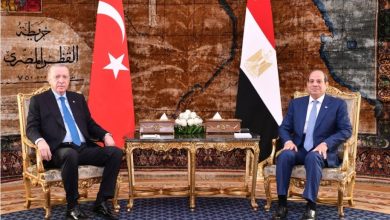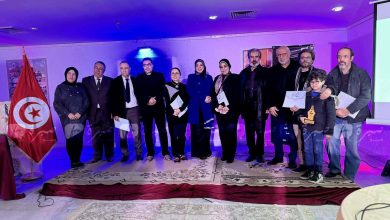
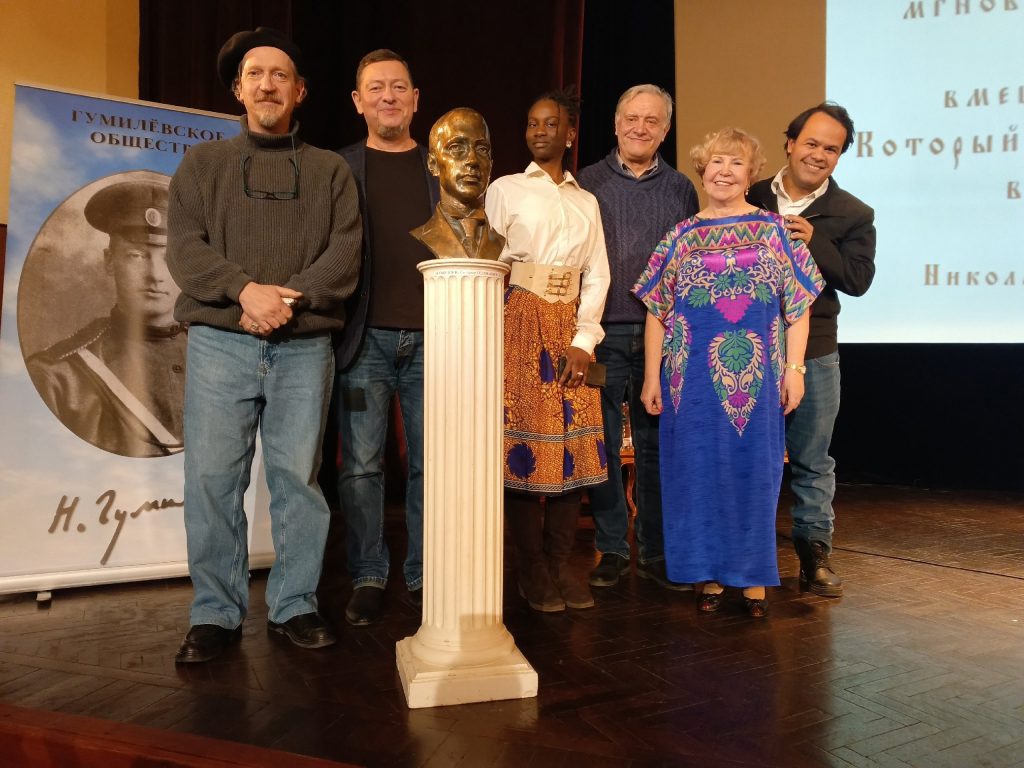 Poet Olga Efimova, Moscow : While skeptics continue to boringly ask whether anyone needs poetry today, various poetry events and festivals are taking place one after another in the cultural life of Russia, which provide an answer to this question. Many today call Nikolay Gumilyov their favorite poet. This was confirmed by the full hall in the Central House of Writers in Moscow. The age range of Gumilyov’s fans varies from 16 to 80 years.
Poet Olga Efimova, Moscow : While skeptics continue to boringly ask whether anyone needs poetry today, various poetry events and festivals are taking place one after another in the cultural life of Russia, which provide an answer to this question. Many today call Nikolay Gumilyov their favorite poet. This was confirmed by the full hall in the Central House of Writers in Moscow. The age range of Gumilyov’s fans varies from 16 to 80 years.
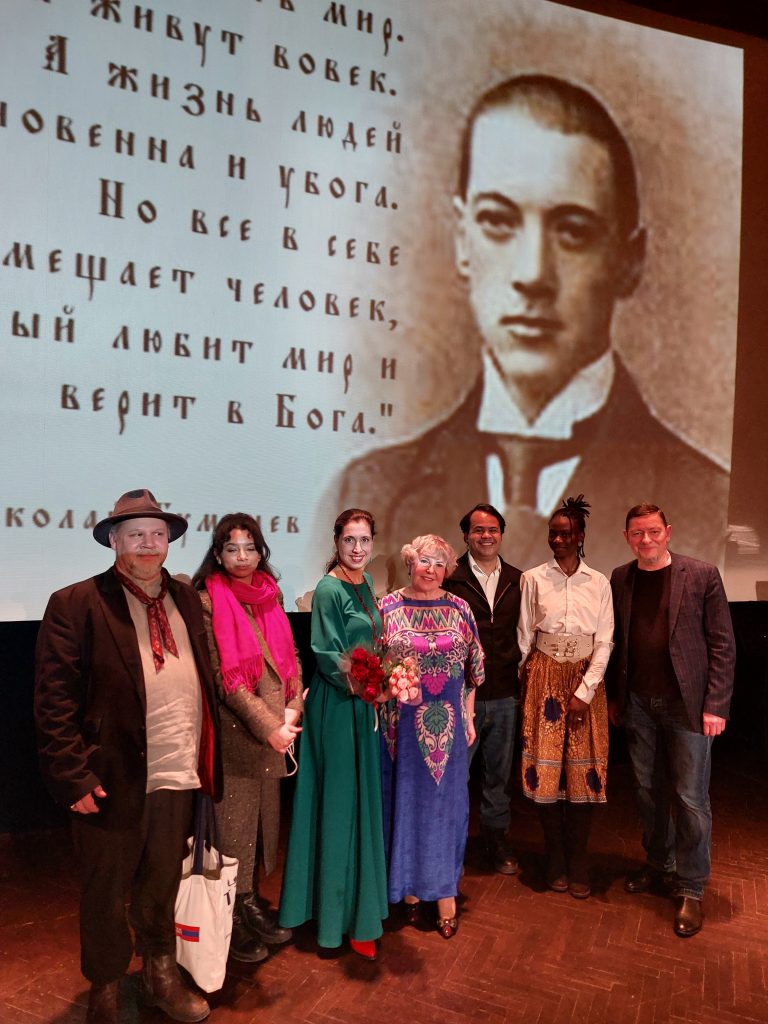
For 14 years now, the Gumilyov Society has been holding events dedicated to the poet’s birthday. The theme is new every year, since the author’s creative heritage makes it possible to build the program in different ways. This year, the focus was on Gumilyov’s prophetic poems and the event was called: “Nikolay Gumilyov – a poet, a visionary, a prophet”
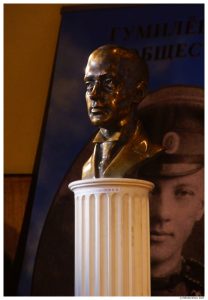
How did Gumilev see the future of his native country in the distant year of 1921, to what extent did the poet foresee his own death? Nikolai passed away in his prime, he was shot at the age of 35, accused of a counter-revolutionary conspiracy. In a number of his poems there are lines that are perceived by many readers and researchers as prophetic. Since 1987, when it became possible to talk about Nikolai Gumilev and publish his poems, hundreds of books and articles have been written about his life and creative legacy. Today we are trying to understand the secret writing of the poet, who even became the hero of the fantasy novel by Lazarchuk and Uspensky “Look into the Eyes of Monsters”. The main idea of the book is that the brave poet was also a bearer of secret knowledge.
Gumilev evening traditionally began with a musical moment by Sergei Rachmaninoff, brilliantly performed by pianist Natalia Terekhova. Olga Medvedko spoke about how Nikolai Gumilyov’s visionary and prophetic experience was embodied in his work, comparing quotes from his poems with facts from the poet’s life and the country as a whole, illustrating her story with slides.
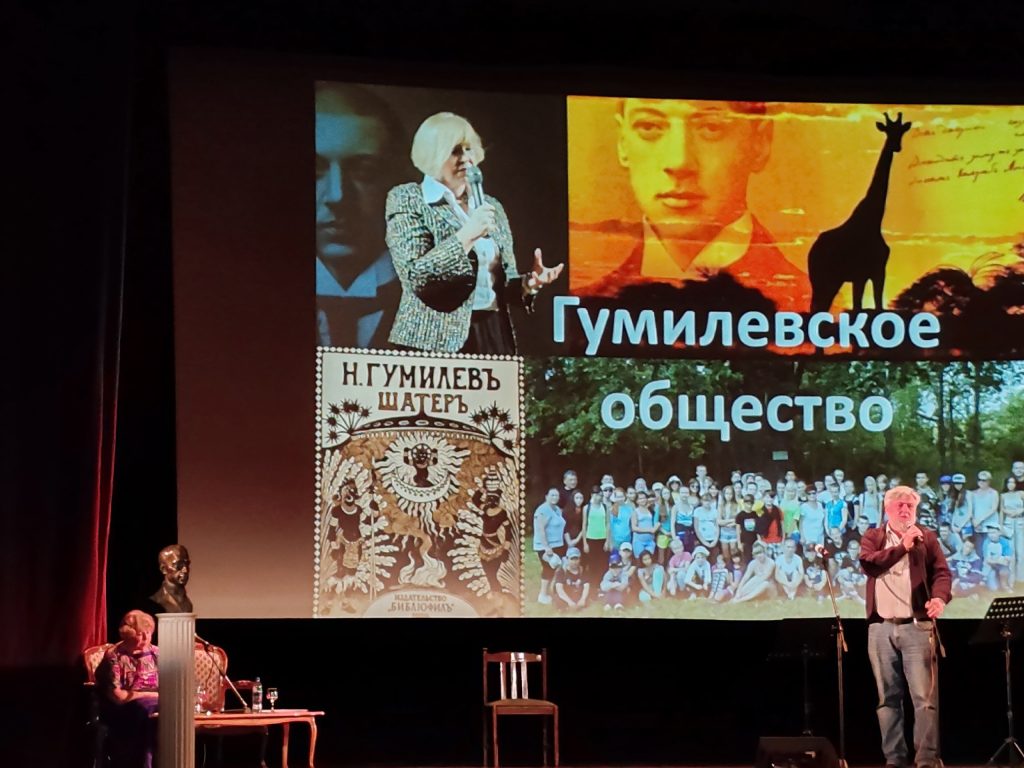
In many ways, Gumilyov remains a mysterious and unsolved poet. A mystery, by definition, is something that is hidden from us. The question is: do we need to decipher and unravel all the secrets? Will poetry then leave our lives? It is probably good that Gumilyov remains a mystery for us, which beckons and attracts us, evokes love and admiration. It was love for Nikolai Gumilyov that attracted hundreds of people to the evening dedicated to him. Out of love for the poet, actors, poets, bards, musicians participated in the evening, not to mention the organizers – the permanent hosts Olga Medvedko, the chairman of the Gumilyov Society and the poet Andrei Korovin.
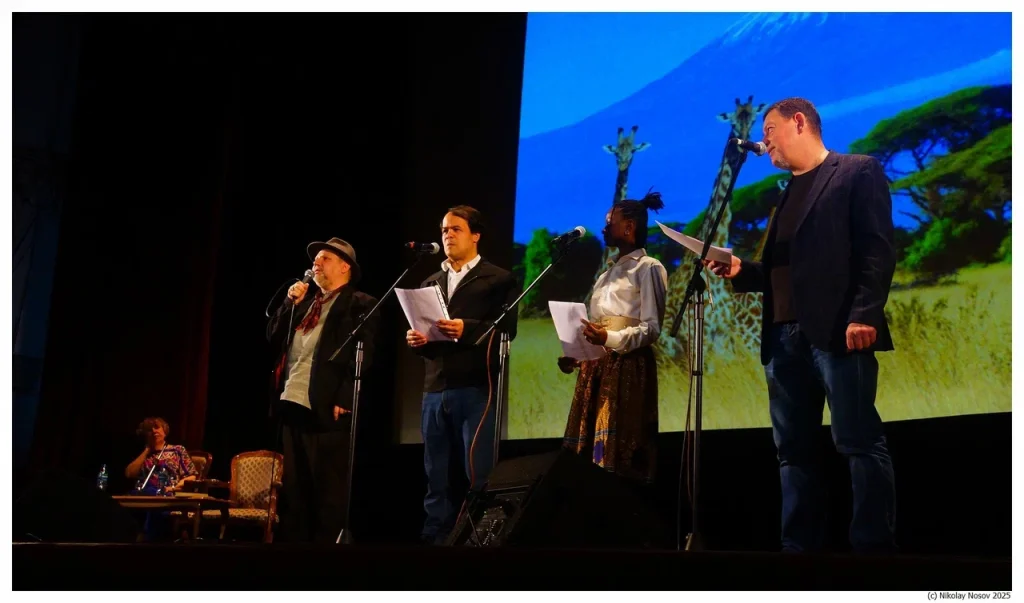
Olga Medvedko summed up the work of the Gumilev Society for the year, and also told us about the origin and development of the museum “House of the Gumilevs” in Bezhetsk, created with the money of enthusiasts in the purchased apartment, previously owned by the Gumilev family. She held an interesting presentation using a slide show about the visionary, prophetic poems of Nikolai Gumilev, comparing quotes from the works with facts from the life of the poet and the whole country. The poet passed away in his prime (he was shot at the age of 35), and in a number of his poems there are lines that are perceived as prophetic. At one time, Anna Akhmatova, Gumilev’s wife, called him a visionary and a prophet and “the most undiscovered poet.” In his poetry, Gumilev tries to find other ways to continue himself, albeit in other forms and in other spheres:
Here you call: “Where is sister Russia,
Where is she, always beloved?”
Look up: in the constellation of the Serpent
A new star has lit up.
There is an amazing story connected with this quatrain. The poem was written by Gumilev in 1918. This prediction of the poet actually came true half a century later! In 1970, Pavel Luknitsky, a researcher of Gumilev’s poetry, was taken aback with surprise when he found a small note in the newspaper “Evening Moscow”: “A new star of the fifth magnitude was discovered in the constellation of the Serpent by Japanese astronomers of the Kurashiki Observatory on February 14.” Pavel always knew that his favorite poet Nikolai Gumilev was a seer. Isn’t this a proof that poets see through time and space?
Long before he was taken to be shot, he himself prophesied his own death. Gumilev the warrior, Gumilev the hero knew for sure that his death would not be ordinary, like that of a simple citizen.
And I will die not in bed, With a notary and a doctor,
But in some wild crevice, Drowned in thick ivy…
He was executed not in the prison cellars, but taken out into the forest. Gumilev’s self-control amazed even his guards. In his poem “The Worker”, Gumilev described exactly what his end would be and how he would die from a bullet:
I will fall, mortally sad, I will see the past in reality,
Blood will gush like a spring onto the dry, dusty and crushed grass.
Everything will happen just like that. With his prophetic eye, he even saw the time of year when it would happen: dry and dusty grass occurs at the end of summer, in August…
Yuri Shchegolkov, director of the Gumilev House Museum and editor-in-chief of the local newspaper “Literary City”, spoke at the evening about the life of the literary city of Bezhetsk, with which the life of the Gumilev family was connected. To the delight of all those present, the sculptor Vasily Selivanov brought a bronze bust of Gumilev that he had created. The sculpture occupied a place of honor on the stage throughout the evening, and we had the complete impression that Gumilev was with us at our evening – here and now.
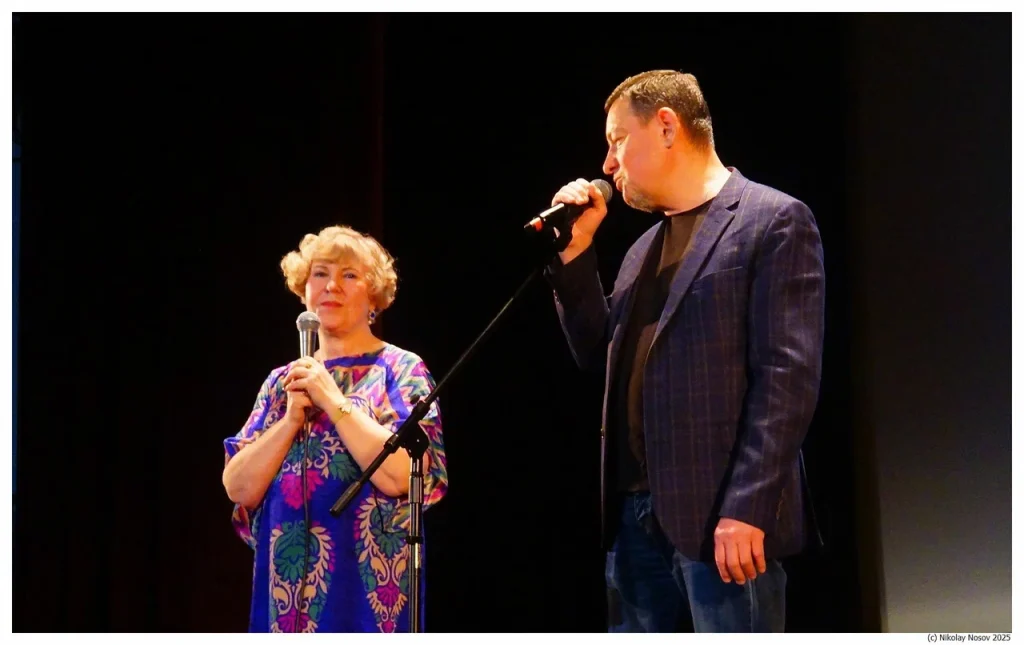
An unforgettable gift to those present was the performance of the singer, composer and poet Elena Frolova, whose repertoire includes songs based on the poems of the Silver Age poets. Elena Frolova has the talent to create a special resonance with the audience, as if electrifying the listeners with her voice – sometimes powerful, sometimes ingratiating. As Elena Frolova herself said, she wanted to create an atmosphere for Nikolai Gumilev’s poems with her performance, so that the listeners could feel the space in which the poet lived and worked.
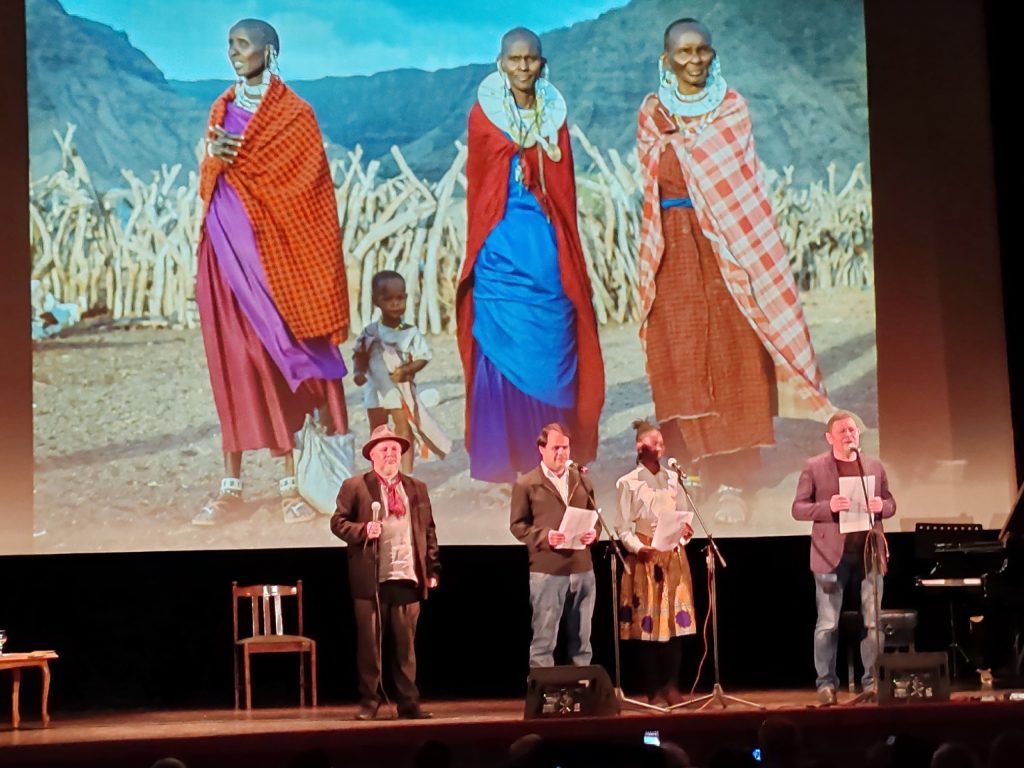 There was another very important theme in Nikolai Gumilev’s poetry – his beloved Africa. Those present saw a film by traveler Nikolai Nosov, who followed in the footsteps of Gumilyov’s African expedition and is a regular participant of our Gumilyov events. In addition, the poet Andrei Korovin recited poems and told us a story about his journey to the Black Continent. Nikolai Gumilyov’s poems were constantly recited from the stage as an offering to the poet. Actress Ekaterina Ishimtseva read several poems, including “Lake Chad”. Poet Andrei Korovin from Moscow, poet and translator from Brazil Astier Basilio, law student from Congo-Brazzaville Loricia Flavi, poet and translator from Austria Alexander Nitzberg read the famous “Giraffe” by Gumilyov in different languages. Listening to the sound of familiar lines in foreign languages was a fascinating adventure: Portuguese, German and Russian have completely different phonetic structures, but the music of Gumilyov’s verse was nevertheless recognizable. The bard and orientalist Dmitry Streshnev performed Gumilev’s unforgettable “Captains”.
There was another very important theme in Nikolai Gumilev’s poetry – his beloved Africa. Those present saw a film by traveler Nikolai Nosov, who followed in the footsteps of Gumilyov’s African expedition and is a regular participant of our Gumilyov events. In addition, the poet Andrei Korovin recited poems and told us a story about his journey to the Black Continent. Nikolai Gumilyov’s poems were constantly recited from the stage as an offering to the poet. Actress Ekaterina Ishimtseva read several poems, including “Lake Chad”. Poet Andrei Korovin from Moscow, poet and translator from Brazil Astier Basilio, law student from Congo-Brazzaville Loricia Flavi, poet and translator from Austria Alexander Nitzberg read the famous “Giraffe” by Gumilyov in different languages. Listening to the sound of familiar lines in foreign languages was a fascinating adventure: Portuguese, German and Russian have completely different phonetic structures, but the music of Gumilyov’s verse was nevertheless recognizable. The bard and orientalist Dmitry Streshnev performed Gumilev’s unforgettable “Captains”.
The culmination of the evening was the performance of the Dead Poets Band. Accompanied by piano and violin (Gennady Sbrodov), talented artists presented a musical and poetic composition based on the poems of Nikolai Gumilev. We heard early Gumilev performed by Irina Kovalevskaya. These recitations were like revived modernism, which immersed the listeners in the atmosphere of the “Stray Dog” cafe. The audience listened with bated breath to “The Magic Violin” and “The Lost Tram” in the expressive performance of Bogdan Bonchuk. And in the poem “Star Horror”, the symbolic space of prehistoric antiquity was revealed to the audience thanks to the subtle performing art of Lilit Karapetyan.
Like all great Russian poets, Gumilev is a prophet and a seer. His poems tell us about the mysterious connection between the earthly and the transcendental, about the immortality of the spirit and soul, about the inseparability of life and death, about the divine beauty of the world and man. In his poetry there is a secret that we cannot solve, but we can feel our involvement in it.
I wonder what surprises await us next year, which will be a double anniversary – we will celebrate 140 years since the birth of Nikolai Gumilyov and 15 years since the founding of the Gumilyov Society.


